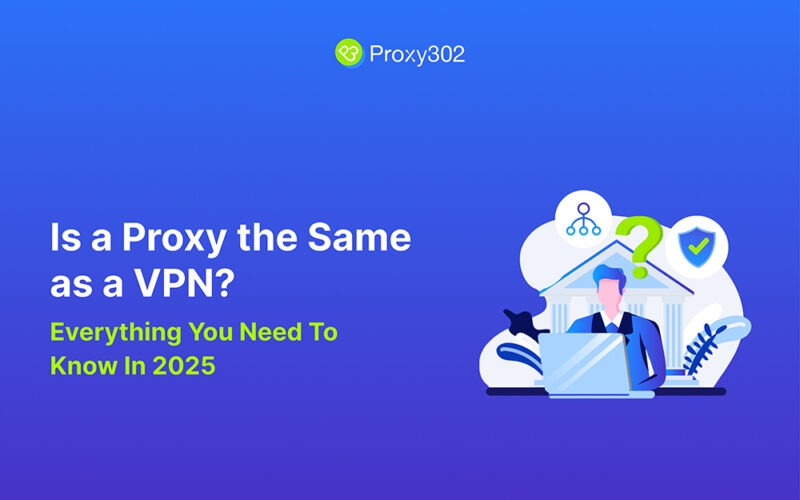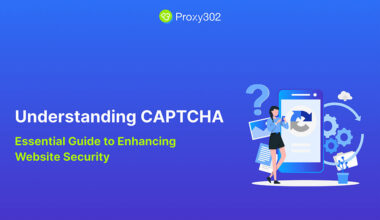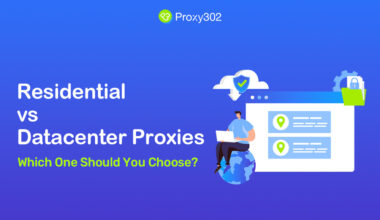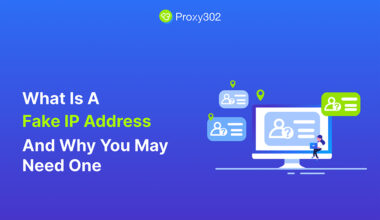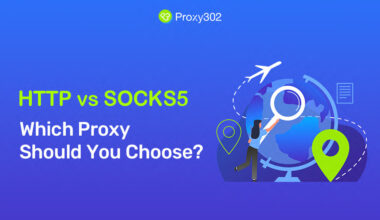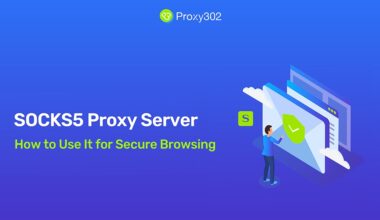When it comes to online privacy and security, two tools often come up in conversations: proxies and VPNs. But are they the same thing? Spoiler alert: they’re not. While both can help you hide your IP address and access restricted content, they work in very different ways and serve different purposes. So, what’s the difference, and which one should you use? In this guide, we’ll break it all down for you—no tech jargon, just plain English. Plus, we’ll show you how Proxy 302 can meet your proxy needs with its 65M+ global IPs, city-level targeting, and pay-as-you-go model. Let’s get started!
What Is a Proxy?

Let’s start with the basics. A proxy server acts as a middleman between your device and the internet. When you use a proxy, your internet traffic is routed through the proxy server, which assigns you a different IP address. This hides your real IP and makes it seem like you’re browsing from a different location.
How Does a Proxy Work?
Imagine you’re sending a letter, but instead of mailing it directly, you give it to a friend to send on your behalf. That friend is the proxy. They handle the delivery, and the recipient only sees your friend’s return address, not yours. Similarly, a proxy server handles your internet requests, masking your real IP address.
Common Use Cases for Proxies
- Web Scraping: Collect data from websites without getting blocked.
- Bypassing Geo-Restrictions: Access region-locked content (e.g., streaming services).
- Anonymous Browsing: Hide your IP address for basic anonymity.
- Load Balancing: Distribute traffic across multiple servers to improve performance.
Did you know? According to a 2023 report by Oxylabs, 62% of businesses use proxies for web scraping and data collection. Proxies are a go-to tool for tasks that require scalability and anonymity.
What Is a VPN?
Now, let’s talk about VPNs. A VPN (Virtual Private Network) also hides your IP address, but it does much more than that. It encrypts all your internet traffic, creating a secure tunnel between your device and the VPN server. This ensures that no one—not even your internet service provider (ISP)—can see what you’re doing online.
How Does a VPN Work?
Think of a VPN as a secure, private highway. Instead of driving on a public road where everyone can see you, you’re on a private route that’s completely hidden. All your data is encrypted, making it virtually impossible for hackers or snoops to intercept.
Common Use Cases for VPNs
- Online Privacy: Protect your sensitive data from prying eyes.
- Secure Browsing on Public Wi-Fi: Prevent hackers from stealing your information.
- Accessing Restricted Content: Bypass censorship in restrictive regions.
- Remote Work: Securely access company networks from anywhere.
Fun fact: A 2022 survey by Security.org found that 85% of VPN users primarily use VPNs for enhanced online privacy and security.
Key Differences Between Proxies and VPNs

Now that we’ve covered the basics, let’s dive into the key differences between proxies and VPNs. This will help you understand which tool is right for your needs.
1. Functionality
- Proxy: Acts as an intermediary for specific tasks (e.g., web browsing, web scraping).
- VPN: Encrypts all internet traffic and routes it through a secure server.
2. Security
- Proxy: Does not encrypt your traffic, making it less secure.
- VPN: Encrypts all your data, providing a higher level of security.
3. Speed
- Proxy: Generally faster because there’s no encryption overhead.
- VPN: Slightly slower due to encryption, but the difference is often negligible with a good provider.
4. Use Cases
- Proxy: Ideal for tasks like web scraping, bypassing geo-restrictions, and anonymous browsing.
- VPN: Best for overall online privacy, secure browsing, and accessing restricted content.
5. Cost
- Proxy: Typically more affordable, especially for large-scale tasks.
- VPN: Often more expensive due to advanced features like encryption.
When to Use a Proxy
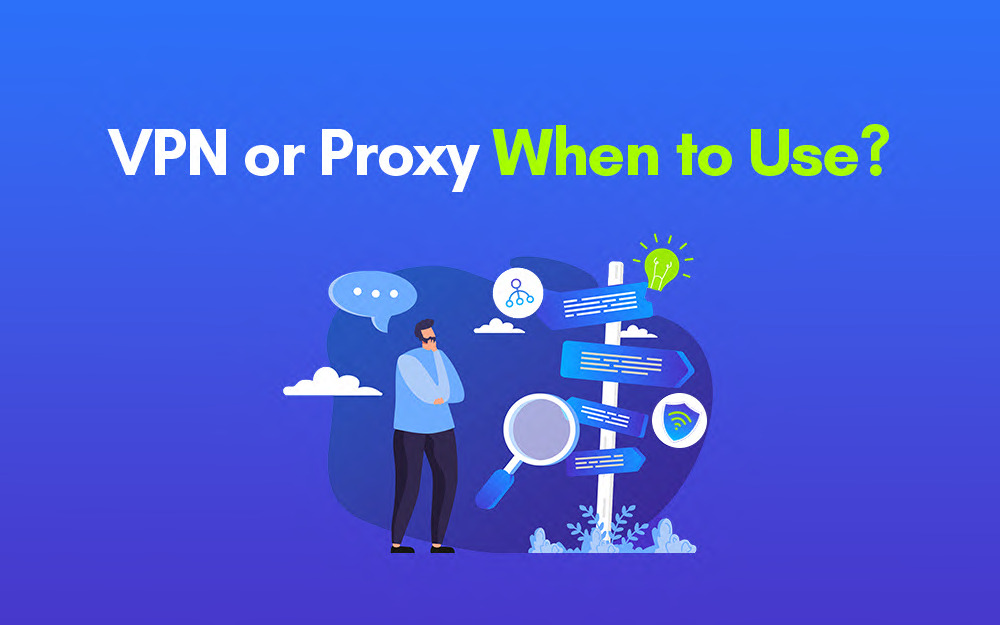
Proxies are incredibly versatile and can be used for a variety of tasks. Here are some practical scenarios where a proxy is the better choice:
1. Web Scraping
Web scraping involves extracting data from websites. However, many sites have anti-scraping measures in place. A proxy helps you avoid IP bans by rotating IP addresses, allowing you to scrape data at scale.
Example: A 2023 case study by Scrapinghub showed that a retail company increased its data collection efficiency by 40% after implementing proxy rotation.
2. Bypassing Geo-Restrictions
Need to access region-locked content? A proxy can make it seem like you’re browsing from a different location, allowing you to bypass geo-restrictions.
3. Anonymous Browsing
If you just need to hide your IP address for basic anonymity, a proxy is a quick and easy solution.
4. Load Balancing
For businesses handling high traffic, proxies help distribute requests evenly across servers, improving performance and preventing server overload.
When to Use a VPN
While proxies are great for specific tasks, VPNs are the better choice for overall online privacy and security. Here’s when you should use a VPN:
1. Online Privacy
A VPN encrypts all your internet traffic, ensuring that no one can see what you’re doing online—not even your ISP.
2. Secure Browsing on Public Wi-Fi
Public Wi-Fi networks are a hotbed for hackers. A VPN encrypts your data, making it safe to browse on public Wi-Fi.
3. Accessing Restricted Content
In countries with strict internet censorship, a VPN can help you bypass restrictions and access blocked content.
4. Remote Work
If you’re working remotely, a VPN allows you to securely access your company’s network from anywhere.
Proxy vs VPN: A Side-by-Side Comparison
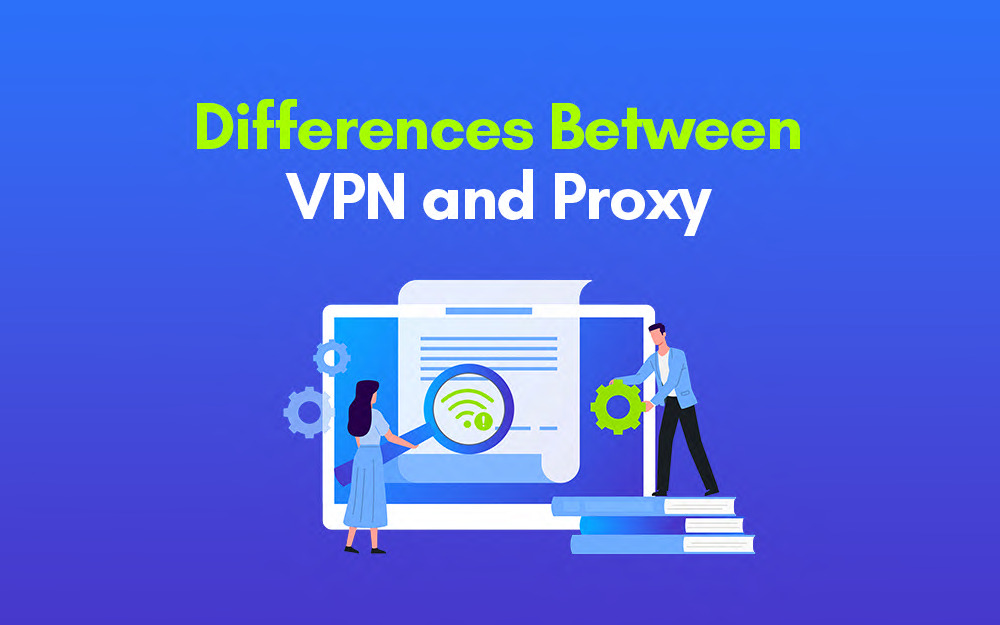
To make it easier to understand, here’s a quick comparison table:
| Feature | Proxy | VPN |
|---|---|---|
| Encryption | No | Yes |
| Speed | Faster | Slightly slower |
| Use Cases | Web scraping, geo-bypassing | Privacy, security, remote work |
| Cost | More affordable | More expensive |
| Ease of Use | Easy to set up | Requires installation |
Why Choose Proxy 302 for Your Proxy Needs?
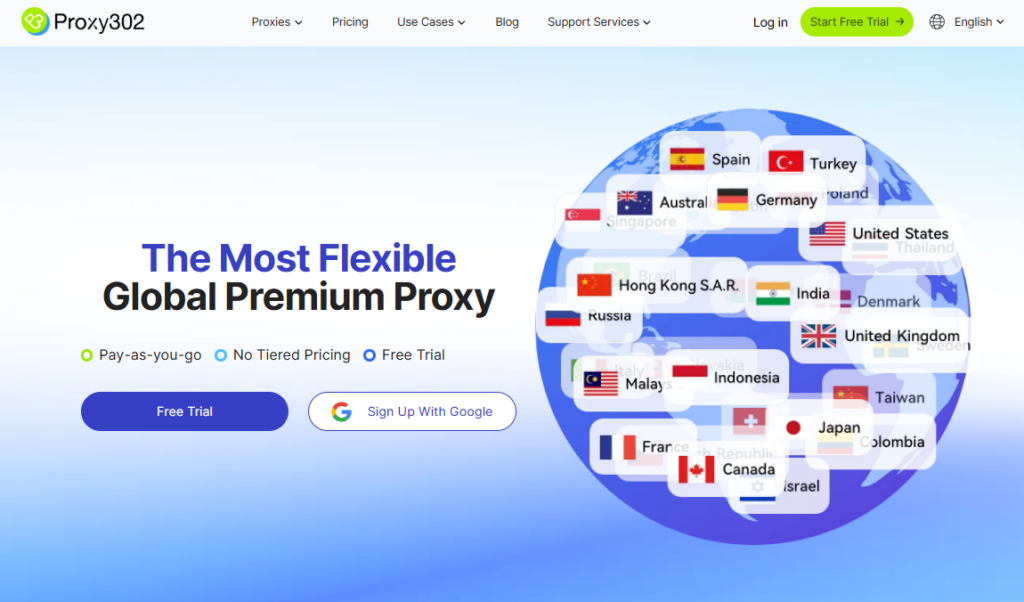
When it comes to proxies, Proxy 302 stands out from the crowd. Here’s why:
- 65M+ Global IPs: Access a massive pool of IPs from around the world.
- City-Level Targeting: Choose IPs from specific cities for precise geo-targeting.
- Pay-As-You-Go: No monthly subscriptions—pay only for what you use.
- 24/7 Support: Get help whenever you need it.
Whether you’re scraping data, bypassing geo-restrictions, or managing multiple accounts, Proxy 302 has you covered.
Conclusion
So, is a proxy the same as a VPN? Not quite. While both tools can hide your IP address, they serve different purposes and offer different levels of security. Proxies are ideal for specific tasks like web scraping and bypassing geo-restrictions, while VPNs are better for overall online privacy and security.
If you’re looking for a reliable proxy service, Proxy 302 is the way to go. With 65M+ global IPs, city-level targeting, and a pay-as-you-go model, Proxy 302 offers everything you need to stay anonymous and efficient online.
Don’t wait—experience the power of proxies with Proxy 302. Sign up for a free trial today and see the difference for yourself! 👉 Start Your Free Trial Now 👈


